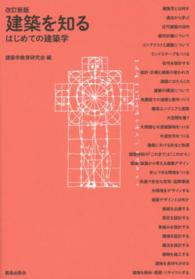- ホーム
- > 洋書
- > 英文書
- > Religion / Ethics
Full Description
This study provides a compelling account of the major works of Henri de Lubac, one of the most influential theologians of the twentieth century, and argues that soteriology provides a lens through which their inner unity can be discerned.
The writings of Henri de Lubac have left an indelible mark on Catholic theology, preparing the ground for, giving shape to, and explaining the seminal event of twentieth-century Catholicism: the Second Vatican Council. Like the Council itself, though, de Lubac remains a contested figure, difficult to classify.
Salvation in Henri de Lubac presents an overview of de Lubac's major works in light of his own statements that a mystical vision animated them all. De Lubac's mystical theology hinges upon a vision of salvation, understood as humanity's incorporation into the triune God through the cross and resurrection of the incarnate Christ. From his writings on the supernatural and theological epistemology, to his treatments of the spiritual interpretation of Scripture, ecclesiology, sacramental theology, and the theology of history, the mystery of the cross looms large, gathering these disparate topics into one focal center while also allowing their distinct contours to remain. By attending to de Lubac's work in this light, Eugene R. Schlesinger brings important themes from French language scholarship into the English-speaking conversation and clarifies the nature of de Lubac's ressourcement. Schlesinger claims that unless we understand de Lubac and his work in light of his own motivations and emphases, we risk distorting his contribution, reducing him to a proxy in the struggle for post-conciliar Catholic self-definition.
Contents
Acknowledgments
Introduction
Part 1. Salvation Desired: Nature, Grace, and Competing Humanisms
1. Saving Grace: Soteriology in the Works on Nature and Grace
2. Authentic Humanism as Salvation
Part 2. Salvation Disclosed: Revelation and Spiritual Exegesis
3. Knowing the Mystery: De Lubac's Paradoxical Theological Epistemology
4. Spiritual Exegesis and/as Salvation
Part 3. Salvation Realized: Ecclesiology and Sacraments
5. Church as Community of Salvation
6. Corpus Mysticum Verumque
Part 4. Salvation Consummated: Eschatology and the Theology of History
7. Salvation as the Meaning of History
8. Salvation as Eschatological Sacrifice
Coda — Gathering the Threads: The Eternal Sacrifice
Conclusion
Bibliography
Index








